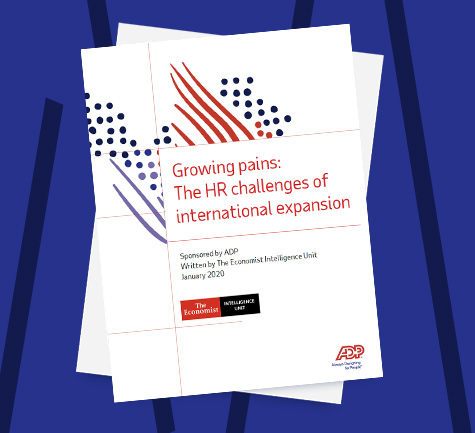The opportunity to diversify markets and supply chains and increase access to specialist skills and capabilities abroad is tempting for many companies. But with expansion comes new challenges, like building and maintaining an international workforce. Whether an enterprise succeeds or fails on the world stage may depend greatly on global HR support.
Table of Contents
What is global HR?
Global HR is how international employers manage geographic, linguistic and cultural differences amongst their workforce to achieve maximum productivity and engagement. Its primary responsibilities include:
- Recruiting suitably skilled employees
- Supporting regulatory compliance
- Standardizing processes and systems
- Analyzing metrics between markets
Challenges of expansion and global HR
Global HR challenges are an inevitable part of expansion and if not properly managed, can hinder a company’s ability to achieve its international ambitions. Leaders at outward-looking companies need to equip themselves with capabilities to address the following difficulties:
- Finding the right employees
Recruiting people with the right vision, skills and adaptability can be demanding, especially when specific technical skills are required. The supply of qualified professionals may also be diminished in certain countries with low unemployment rates.
- Managing scale
As companies increase in size and span a wider range of cultures, managing an international workforce becomes that much more complex. Mergers and acquisitions further exacerbate the problem because in addition to the communication challenges posed by different languages, change naturally gives rise to uncertainty among employees.
- Keeping employees engaged
Engagement and employee performance are usually influenced by improvements in working conditions. Therefore, a company must treat employees in new divisions just as well as it does in its established markets. What’s more, countries with market growth opportunities tend to generate higher engagement scores than those that don’t.
How to succeed at global HR
Expansion is hard and while there is no silver bullet to make it easy, the accumulated knowledge of lessons learned by other companies over time is a good place to start. Here are some tips used by successful international employers:
- Ensure leaders have the proper background
Companies must appreciate that specific skills and experience are required for international expansion. Executives who have built their careers managing domestic operations may not be best equipped to lead global HR.
- Assert the strategic role of HR
HR is not always well represented on boards of directors, but they may need to raise their voices. The more assertive their recommendations – whether it’s identifying who is best capable to lead expansion efforts or deciding which teams to retain in new divisions – the more important people become in the growth of an organization.
- Use data insights effectively
Many businesses have successfully applied analytics to drive global HR operations, including payroll, recruitment and benefits administration. Data analysis also enables managers to identify and share best practices so they can improve processes throughout their organization.
- Let technology guide integration
Of all the tactics, integrating HR systems, workflows and data across geographies can have the most positive impact on global expansion. The key is to adapt processes to technology and not the other way around.
- Build a culture of diversity
If a company’s culture is built on diversity and inclusion and is focused on attracting and retaining local talent, it will be better prepared for international expansion. Balancing the efficiency afforded by centralization with respect for cultural differences further increases the chances of success.
What is global human resource management (HRM)?
Managing HR globally means determining how HR capabilities will be delivered internationally. There are generally two options – scale operations from a central location or create localized HR systems and processes. Most enterprises try to find a balance between the two because while centralization has its advantages, sometimes a local touch is needed for optimal function.
Why is global human resource management important?
The best business opportunities – be they foreign or domestic – can fail if HR is not managed well. In fact, most companies say that HR-related issues are among the most challenging barriers to international expansion.1
What are the main functions of global HRM?
Managing HR internationally may consist of the following:
- Recruiting employees who have the requisite skillsets
- Maintaining compliance with employment laws and customs
- Understanding cultural differences and their HR implications
- Promoting diversity and inclusion
- Managing employee development
- Integrating disparate HR systems, processes or data
- Addressing communication and language barriers
- Planning pay and benefits policies
What is the role of a global HR manager?
If an organization is preparing to expand internationally, it’s the global HR manager’s responsibility to ensure that their department is equipped with the necessary experience and that HR-related matters are addressed in the expansion strategy.
Common global HR mistakes
During the initial phases of an international expansion, the efficiency and costs of HR are less than optimal. Employers might accept short-term solutions to overcome these early challenges of global human resource management, but such fixes may not be ideal long-term. When making an informed trade-off between two options, business leaders should revisit their decision and adjust as needed based on subsequent knowledge.
Another potential pitfall for businesses as they grow their operations globally is pay parity. Should employees in one region receive the same compensation as employees in another, despite different financial market conditions? Some employers try to maintain pay parity across their international division as far as possible, while others set pay according to the rates for local jobs. As the dialogue around pay parity develops around the world, expect stakeholders to demand better visibility and confidence in how this is being managed across borders and cultures.
How ADP can help with global HR
ADP offers global payroll solutions that seamlessly integrate with leading human capital management (HCM) systems. This connectivity can help unify data, streamline HR processes and reduce the complexity of managing an international organization. Options vary based on business size:
Frequently asked questions about global HR
How long does a global HR background check take?
The time required to obtain background information on an individual from a foreign nation depends on the laws of the country. The average wait period is five to 20 days.
What is global human resource strategy?
Workflows and solutions built for domestic business may not be a good fit for international purposes. That’s why employers who are expanding abroad must tailor their HR services for the ever-growing, ever-changing legal and cultural requirements of foreign offices. This process is known as global HR strategy.
How is a global HR system implemented?
When administering HR across different countries, employers must strike a balance between global, regional and in-country provisions. The optimum model of delivery ultimately depends on the maturity and scalability of the employer’s global HR processes.
1Growing pains: The HR challenges of international expansion, January 2020
This article is intended to be used as a starting point in analyzing global human resources and is not a comprehensive resource of requirements. It offers practical information concerning the subject matter and is provided with the understanding that ADP is not rendering legal or tax advice or other professional services.





